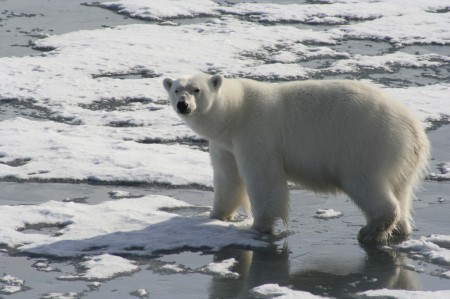
It is said that – besides polar bears – the negative effects of global warming will hit the poor the most. But two recent articles I read suggest that climate change is of little concern to the poor; rather, it is a concern of the well-off who can afford to worry about melting ice caps (and their furry white residents).
In an editorial of today’s Wall Street Journal, Bret Stephens explains that China and India – with good reason – refuse to sign on to any global regime to cap carbon emissions. After all, foreign-imposed carbon emissions restrictions and carbon tariffs on their exports would only slow down China and India’s economic development and prevent these countries from improving the lives of millions of impoverished citizens. Stephens argues that today’s poor will benefit from economic development (by way of a free market economy) more than from international measures to curtail global warming.
But there are millions of poor who don’t have a voice, who happen to live in a country with few prospects to compete successfully in the global economy and who are sidelined by progress. Ask a resident of Bangladesh, who may soon be displaced and lose all his modest possessions due to rising sea levels. Or ask a farmer in Africa who can’t feed his family any more due to years of droughts thought to be caused by rising global temperatures. Or ask the millions and millions of poor around the world with no access to health care who are affected by the spread of new diseases and harmful organisms that thrive in warmer temperatures.
So when it comes to climate change, ‘the poor’ as a category does not exist. It rather depends on where you live in poverty.
Take Russia – another emerging economy and BRIC country, like China and India. Apparently, many Russians actually embrace the idea of warming temperatures, according to The National newspaper. For Russians living in the north of the country, the thawing of the ice can bring increased prosperity to them. If the northern coast remained ice-free all year round, locals would benefit from an increase in commercial traffic. The melting of the permafrost in the Russian tundra would provide Russians with more land for agriculture. Furthermore, the melting of the polar ice cap would open up a bounty of natural resources, including oil, gas and precious metals.
So far, there seemed to be a global consensus that climate change in and of itself is a bad thing. Well, as Russia is concerned, this common wisdom now seems to stand on thin ice.
A second commonplace assumption – namely that BRIC countries need to participate in global efforts to curb climate change for their own good – is challenged by Stephens’ editorial today. Instead, he wants to allow developing countries to develop with very few restrictions and let them get rich before they can (and, as Stephens insists, will) clean up their environment and become part of international agreements to fight climate change.
Well, good luck with that. I fear the polar bears won’t live to cheer them on.

